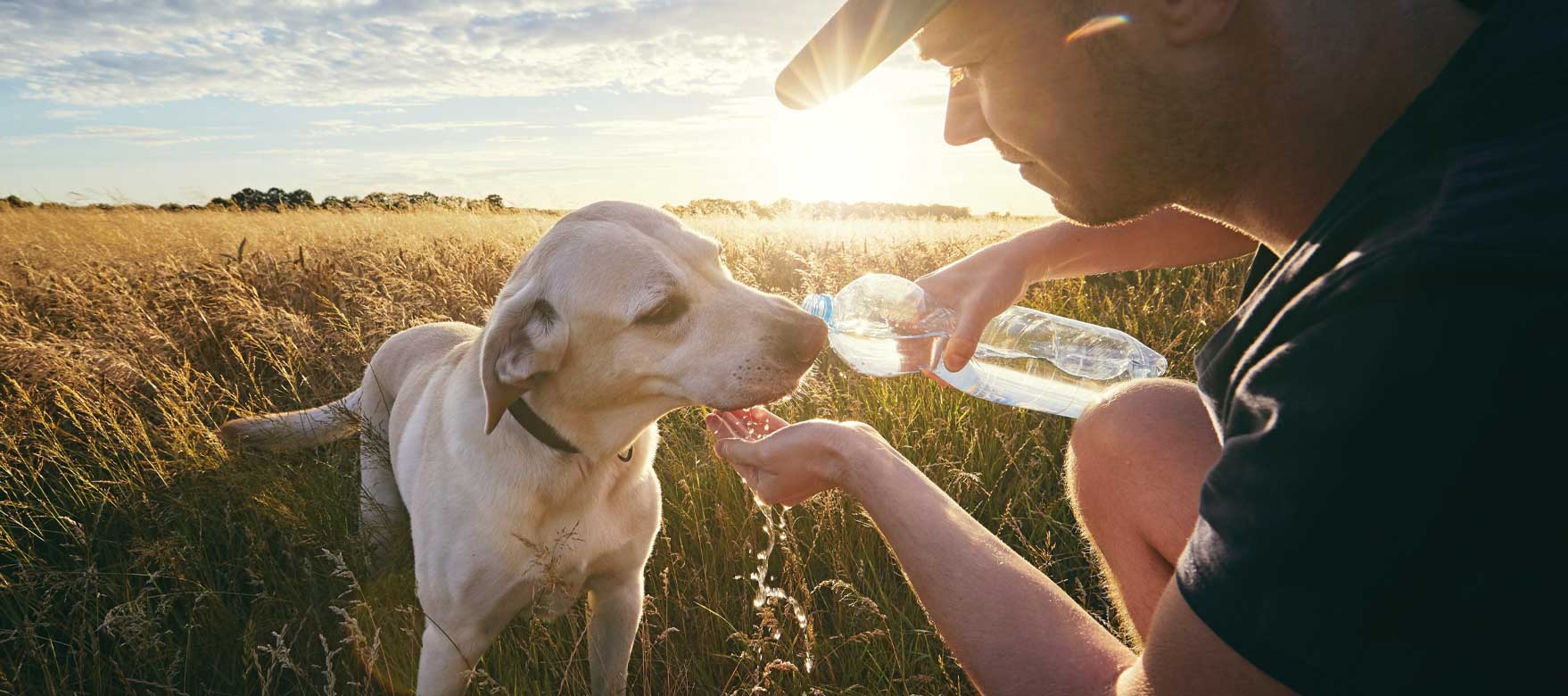Pets Are Cool, But They Get Hot Fast
July is National Pet Hydration Awareness Month for a reason. Actually, two reasons – summers are getting longer, and summers are getting hotter. And pets get hot fast. Neither cats nor dogs have sweat glands like people, so they are quick to overheat. Since they are made up of more water than humans, dogs need to consume about one ounce of water for every pound they weigh, and cats should get between 3.5 to 4.5 fluid ounces of water for every 5 pounds of body weight, every day.
Last year July’s average daytime temperature tied for the second hottest July on record. That’s hot! But it doesn’t even need to be really hot for your pets to become dehydrated. The good news is that with observation, prevention, and knowing the signs of dehydration, you can easily keep your pets safe and satisfied.
Don’t Let Dehydration Get the Drop on Your Pet
Avoiding pet dehydration can be as simple as following some simple habits:
- Always have fresh water available, with multiple bowls in the places your pets occupy most. There are even more creative ways than bowls to quench your pets’ thirsts with wide ranges of fancy fountains and decorative dispensers.
- Plan your pets’ outdoor activities during the cooler parts of the day, like early morning or evening.
- Make sure your pets have access to shade.
- Never leave your pets in a car on a warm day. Even a 70 degree day can climb to more than 100 degrees in a car.
- Mix low-sodium / sodium-free broth or ice cubes in the water dish to make drinking more tempting.
- Add water to your pets’ food at mealtimes to increase their daily water consumption.
- Take collapsible water bowls when on the go, or teach your dog to drink from a water bottle.
- Some cats may have preferences for certain bowl types, so consider testing different options.
Some signs of dehydration in your pets may include:
- Loss of appetite
- Dry mouth
- Tacky or inflamed gums
- Dry nose
- Diarrhea
- Excessive panting
- Decreased skin elasticity
- Sunken eyes
- Low energy
If You Think Your Pet is Dehydrated
If you suspect your pet has moderate or severe dehydration, seek veterinary attention. If the dehydration is mild and your pet isn’t vomiting, give frequent, small amounts of water by mouth (about 1 teaspoon for a cat or small dog to 1 tablespoon to ¼ cup for a medium to large dog every few hours), but don’t allow your pet to have immediate free access to large amounts of water or liquid, and don’t feed them any dry food until you speak to your vet.
Partners in Pet Protection
Armed Forces Insurance and our partner Embrace Pet Insurance can help you protect your pets with comprehensive accident and illness insurance that covers your dogs or cats when the unexpected happens, including emergency care, hospitalization, surgery, specialist care, diagnostic testing, prescription drugs, and 24/7 pet health line. Embrace’s nose-to-tail policies cover breed-specific conditions, chronic conditions, cancer, dental illnesses, and preventable conditions like Lyme disease, parvo, and parasites. Plus, Embrace’s optional Wellness Rewards* plan can be purchased to reimburse you for routine and preventative care including everyday veterinary, training, grooming, teeth cleaning, chiropractic care costs, and more. Get your free quote in minutes.
*Wellness Rewards is offered as a supplementary, non-insurance benefit administered by Embrace Pet Insurance Agency in the United States. Wellness Rewards is not available in Rhode Island.
More Articles
-
Flooding
April showers may bring May flowers, but they can also bring flooding. And with more climate change, the risk of flooding increases. The National Oceanic and Atmospheric Administra...
-
It's PCS time again!
It’s that time of the year again! And if you’re a military family preparing for a move, there are a few things related to your insurance that you’ll want to think about. Our AFI ag...
-
Summer storms can be very costly — the time to prepare is now
Summer weather can be brutal. Almost everyone needs to prepare for the possibility of flooding, as even dry, desert areas can get summer storms that the ground just can't handle. R...

